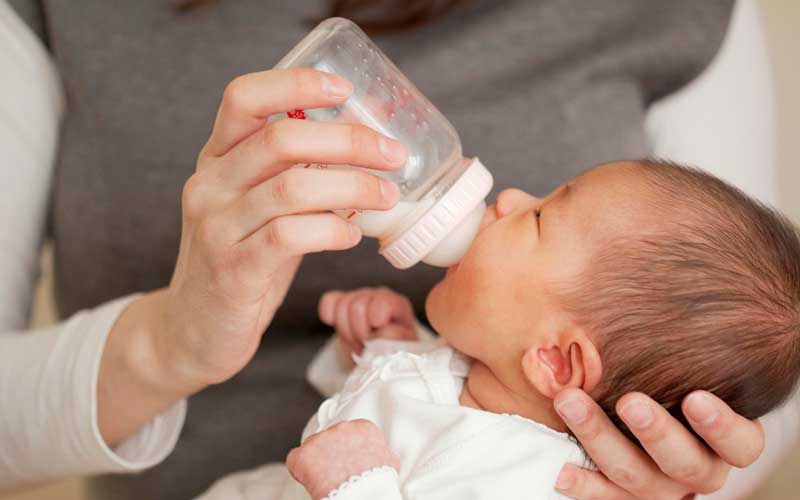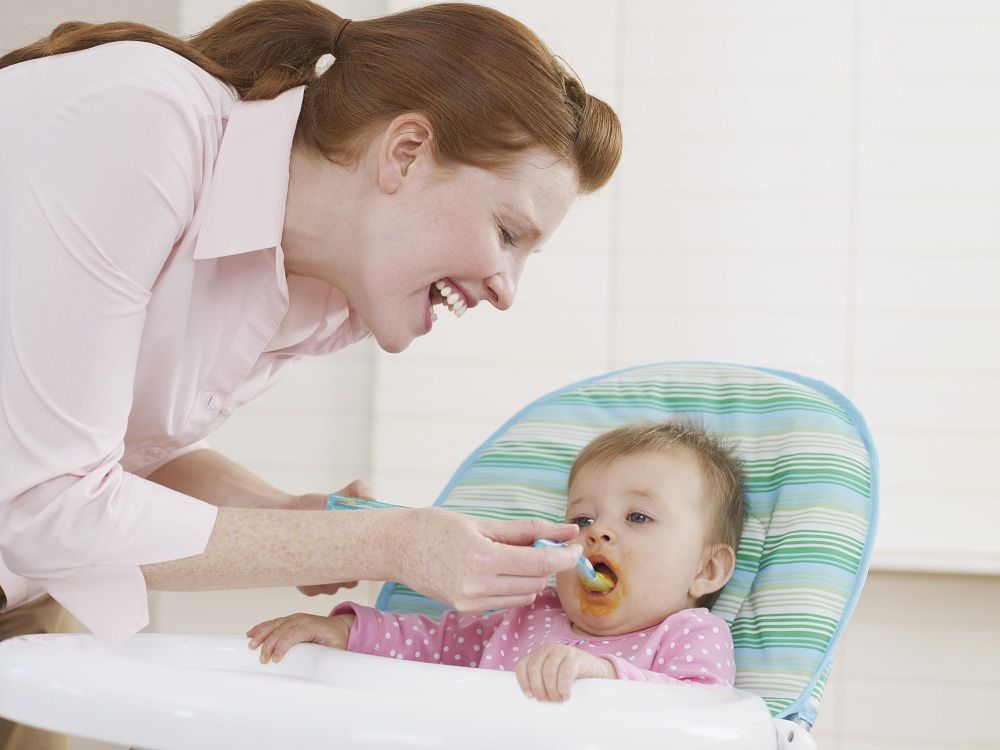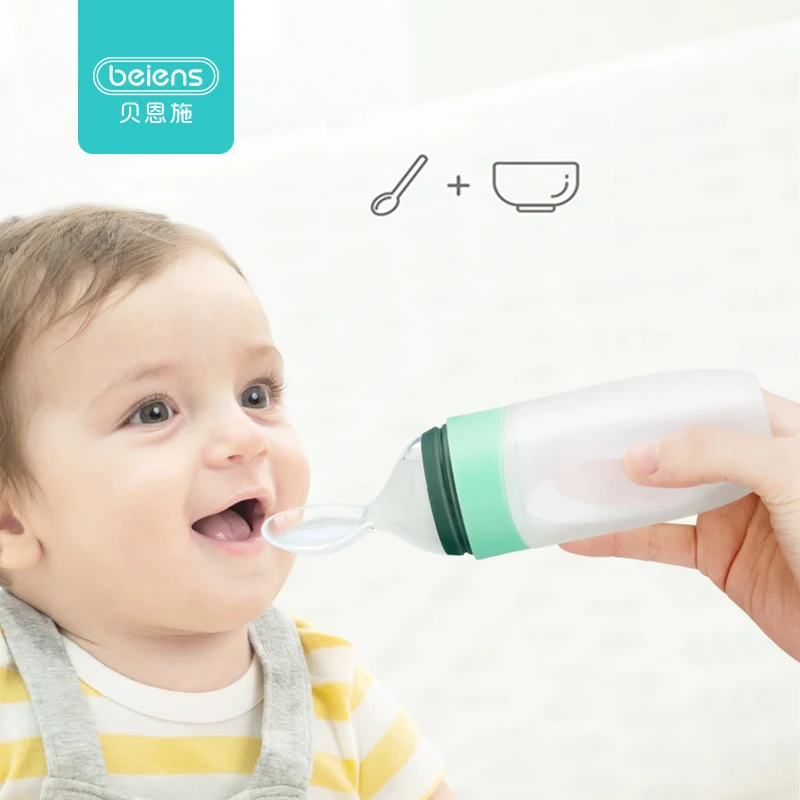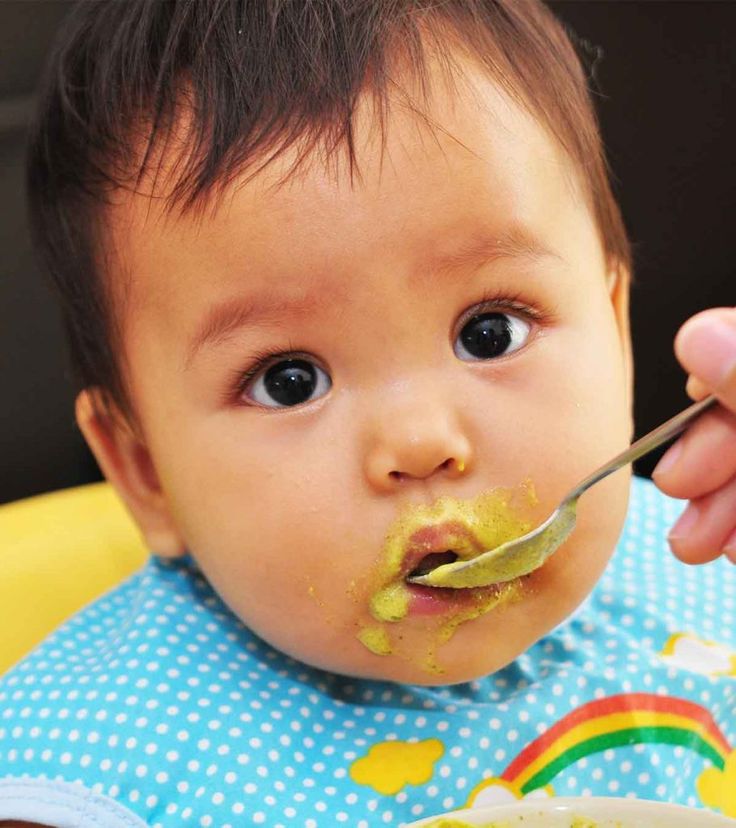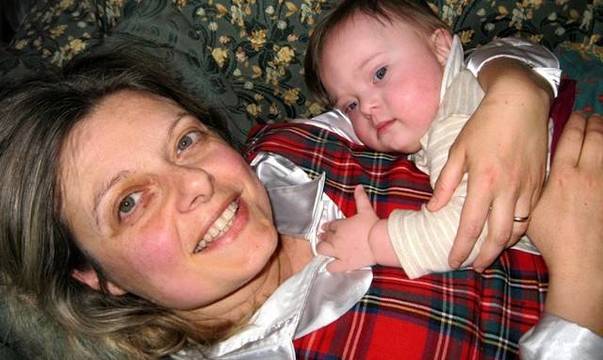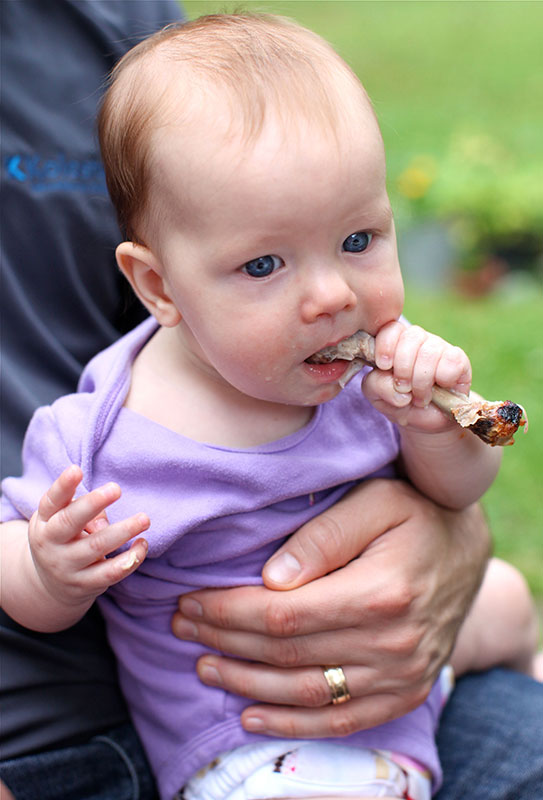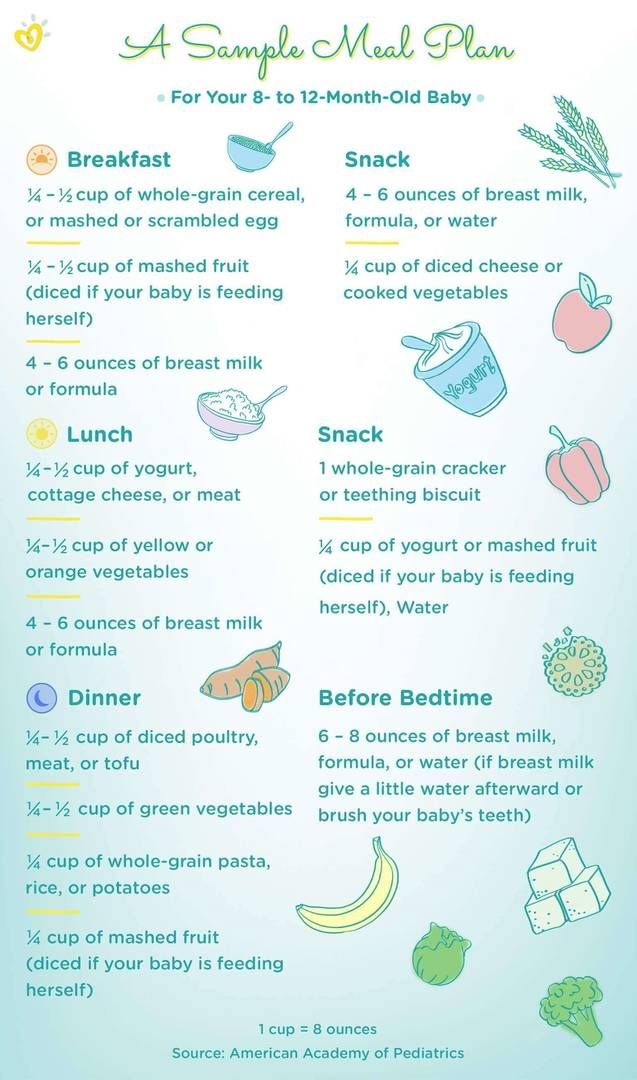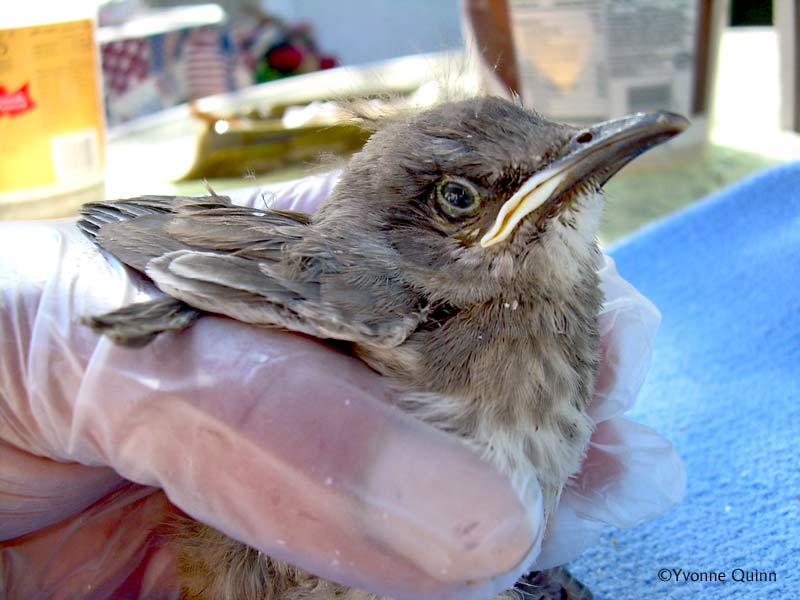Foods that make babies fussy during breastfeeding
Breastfeeding FAQs: Your Eating and Drinking Habits (for Parents)
Breastfeeding is a natural thing to do, but it still comes with its fair share of questions. Here's what you need to know about your eating and drinking habits — and how they may affect your baby — during breastfeeding.
What Should I Eat?
As you did when you were pregnant, eat plenty of fruits, vegetables, whole grains, protein, and calcium-rich foods. You’ll need about 450 to 500 extra calories per day while breastfeeding. Follow the recommendations in the MyPlate food guide and you'll be well on your way to giving both you and your baby a nutritious diet.
Breastfeeding can make you thirsty, so keep a water bottle nearby so it's there when you need it.
Do I Need to Take Vitamins?
Your doctor may ask you to continue taking a prenatal vitamin or women’s supplement.
It’s important to get enough iodine, an important mineral, while breastfeeding. To get enough:
- Take a supplement with 150 micrograms of iodine per day.
- Use iodized salt in your cooking.
- Eat foods that are high in iodine, like seafood and dairy products.
If you are vegan or don't eat fish or dairy, talk to your doctor about getting checked for iodine deficiency.
Can My Baby Have a Reaction to Something I Eat?
It’s possible for your breastfed baby to have an allergic reaction or sensitivity to something you eat or drink.
Foods like beans, broccoli, cauliflower, or some dairy products can cause fussiness, gassiness, or colicky behavior in some babies. Foods like cow's milk, soy, wheat, corn, oats, eggs, nuts and peanuts, and fish or shellfish are common allergy-causing foods.
If you think your baby had a reaction to a food, call your doctor and avoid eating or drinking anything your little one can't seem to tolerate. Keep a journal of exactly what you eat and drink, along with any reactions your baby had. This can help both you and your doctor pinpoint what the problem food, or foods, might be.
Although such a reaction is extremely rare, if your child has trouble breathing or has swelling of the face, call 911 right away.
Is Alcohol Still a "No-No"?
Drinking in moderation — one or two drinks within a 24-hour period — is fine, as long as you wait to feed your baby.
When you drink alcohol, a small amount gets into your breast milk. The amount of alcohol in breast milk depends on the amount of alcohol in the blood. It takes about 2 hours after having one drink for the alcohol to no longer be a concern for your baby. So do not give your baby fresh breast milk for at least 2 hours if you've had one drink, 4 hours if you've had two drinks, and so on.
If you plan to drink more than a few, do so after breastfeeding's been established for about a month and then "pump and dump." This is when you pump your milk and throw it away.
But drinking to excess when you're nursing is not a good idea. Even if you "pump and dump," there are other risks to your baby.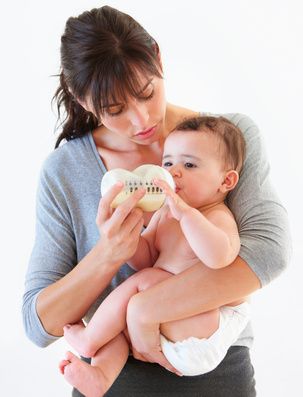 Drinking too much changes your ability to be alert and think clearly. It affects how you care for your baby and may prevent you from responding to your baby's needs. It's also a risk factor for SIDS (sudden infant death syndrome).
Drinking too much changes your ability to be alert and think clearly. It affects how you care for your baby and may prevent you from responding to your baby's needs. It's also a risk factor for SIDS (sudden infant death syndrome).
Should I Still Avoid Some Types of Fish?
As during pregnancy, nursing moms should avoid or limit eating fish that is high in mercury. High mercury levels can damage a baby’s developing nervous system.
Can I Have Caffeine?
As with alcohol, it's best to limit caffeine while breastfeeding. One or two cups of coffee a day are fine, but more than one or two servings per day may affect your baby's mood and/or sleep.
Reviewed by: Jamila H. Richardson, BSN, RN, IBCLC
Date reviewed: January 2021
8 Foods to Avoid When Breastfeeding Your Baby
We’ll say it over and over again: breastfeeding is one of the best things that you can do for baby. Breastmilk contains essential nutrients that help to nourish a growing baby and provides unbeatable immunity support.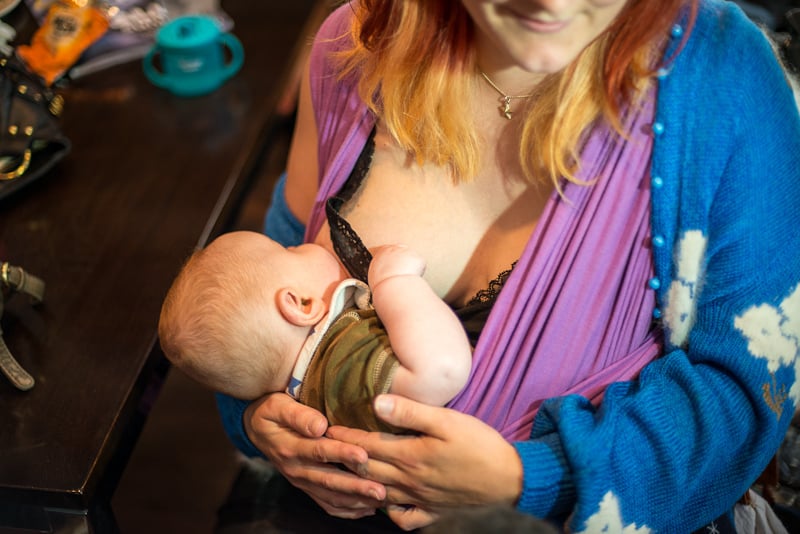 The benefits of breastmilk are far and wide, plus it’s free and provides a wonderful bonding experience. Yet all good things come with some problems every now and then. While breastmilk is the best thing for your baby, it can make your baby fussy. When this happens, it’s understandable to get confused and even a little bit worried—but don’t worry. Often times the reason that your breastfed baby is getting fussy is because of something you’ve eaten that puts strain on your baby’s digestive tract. In this article, we’ll explore eight foods to avoid while breastfeeding as they could be making your breastfed baby fussy.
The benefits of breastmilk are far and wide, plus it’s free and provides a wonderful bonding experience. Yet all good things come with some problems every now and then. While breastmilk is the best thing for your baby, it can make your baby fussy. When this happens, it’s understandable to get confused and even a little bit worried—but don’t worry. Often times the reason that your breastfed baby is getting fussy is because of something you’ve eaten that puts strain on your baby’s digestive tract. In this article, we’ll explore eight foods to avoid while breastfeeding as they could be making your breastfed baby fussy.
Common Foods that Make Breastfeeding Babies Fussy
Gas is completely normal for both babies and adults. It’s a byproduct of your gastrointestinal system and isn’t cause for concern. However, as we all know, sometimes gas can be uncomfortable. When it happens to adults, we can take an over the counter medication to help ease discomfort but when it happens to babies, it’s a little different.
Babies can’t directly tell you what’s wrong. The way they communicate is through crying or getting fussy. If you notice a trend where your baby gets fussy after breastfeeding, it’s likely because something you’re eating is upsetting their stomach. Here are some common foods that make breastfeeding babies fussy:
1. DairyDairy is the most likely culprit behind fussiness. Cow’s milk is much harder for underdeveloped bodies to digest and can cause excess gas or discomfort in babies. When you drink milk caseins, the proteins found in dairy, pass through your blood and into your breast milk production. Newborns and young babies cannot digest caseins, so they become fussy and gassy. If your baby is a little older and they’re still getting fussy from dairy, it could be because of an allergy. Try eliminating all forms of processed dairy and see if it makes a difference.
2. SoySoy is another common allergen that babies react to.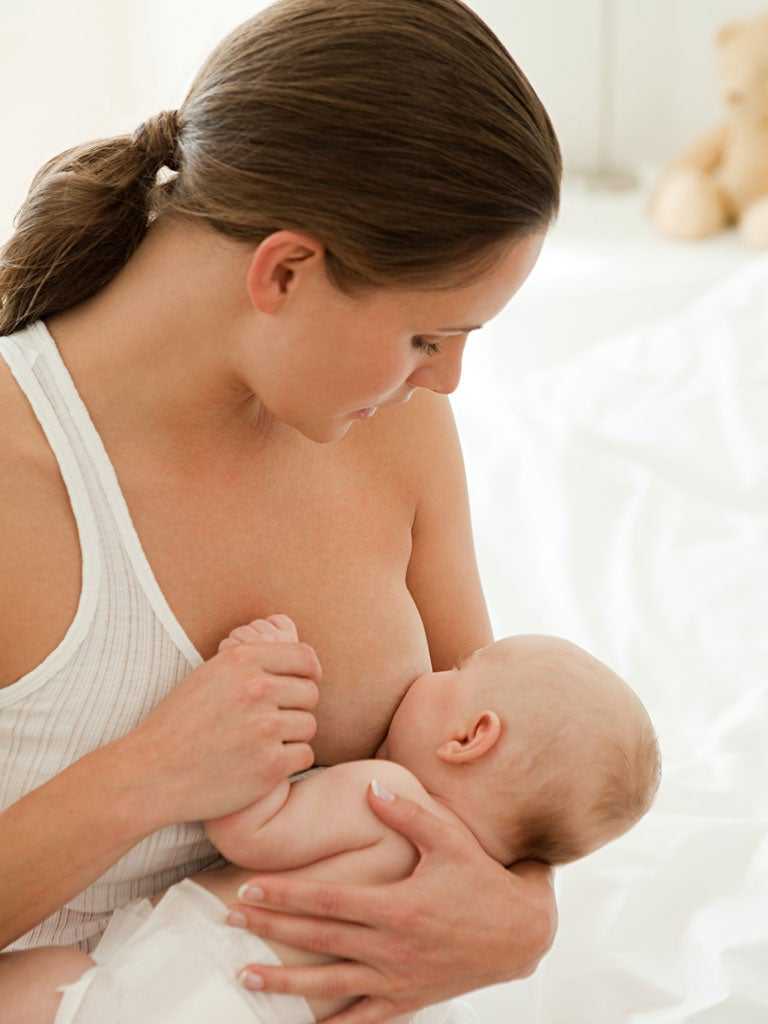 Many breastfeeding moms equate fussiness with their soy intake, so if you’re dairy-free and using soy alternatives, you’ll need to consider a different alternative.
Many breastfeeding moms equate fussiness with their soy intake, so if you’re dairy-free and using soy alternatives, you’ll need to consider a different alternative.
In addition to dairy and soy, wheat and corn have been known to cause food allergy responses and have subsequently been found as the source of a breastfed baby’s fussiness. If you think that you might be sensitive to wheat or corn, of if you have a family history of allergies in any of these areas, you should consider eliminating them from your diet. This is more difficult than eliminating dairy products, as wheat, corn, and even soy are found in many different processed foods. Make sure that you read the labels and talk to your doctor about alternatives that are safe for breastfeeding.
4. CaffeineCaffeine gives you a much-needed energy boost during motherhood, but it can actually contribute to problems. A lot of babies are sensitive to caffeine, which causes fussiness. Your caffeine is transmitted through breastmilk, so try to limit your caffeine intake to one cup of coffee or tea in the morning.
Your caffeine is transmitted through breastmilk, so try to limit your caffeine intake to one cup of coffee or tea in the morning.
If you love spicy foods, you’ll probably need to dial it back while you’re breastfeeding. The spices can upset your baby’s stomach and tends to change the way your breastmilk smells and tastes, which could lead to a refusal to eat altogether. The main spicy foods to avoid whilte breastfeeding are garlic, curry, chili pepper, and cinnamon as these are known to cause higher levels of indigestion.2
6. High-fiber FoodsWhile eating a breastfeeding diet that’s high in fiber is good for mom, it can cause fussiness in your baby. The high fiber content in a baby’s diet can contribute to uncomfortable gas and indigestion, so you’ll want to dial it back a little bit. You can still eat a diet that gives you fiber but try to avoid certain vegetables while you’re breastfeeding such as broccoli, cauliflower, brussels sprouts, and cabbage.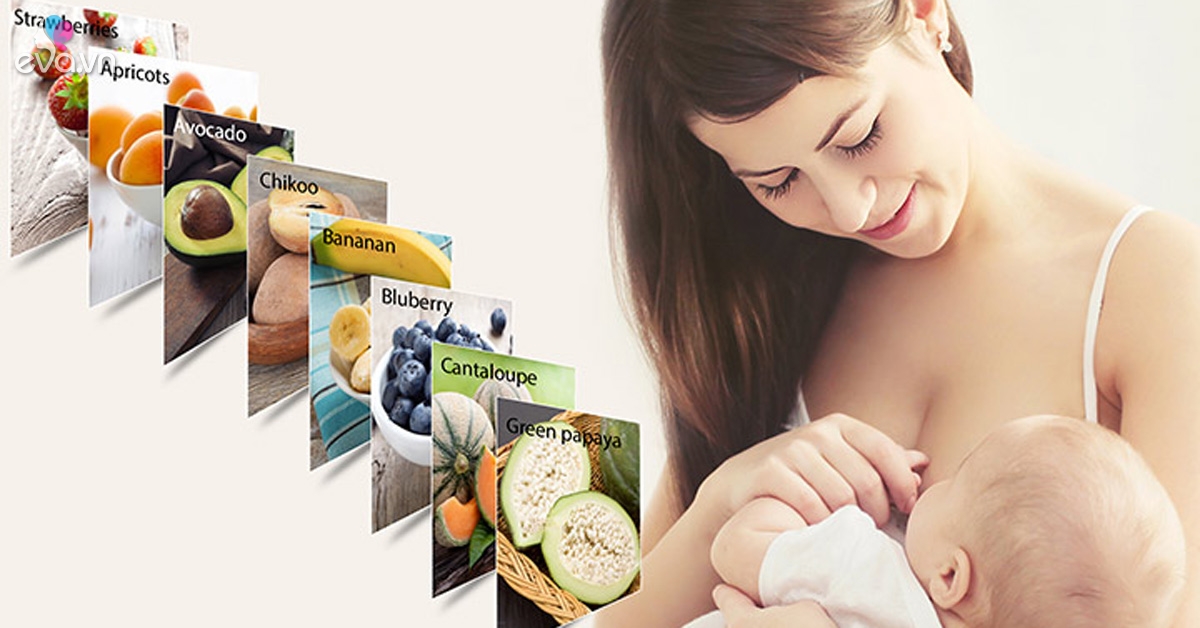
Some women notice that their breastfed baby gets fussy when they eat chocolate. This is completely normal. A lot of times, it’s more-so due to the amount of chocolate that’s eaten, not the chocolate itself.2 If you like to indulge, try limiting yourself to one square of chocolate at a time to help ease your baby’s fussiness.
8. Citrus FruitsCitrus fruits can cahuse discomfort in newborn and infant digestive tracks, so it’s best to limit them in your diet until your baby’s older. The acidity of the fruits cause irritation to their digestive tract, which in turn leads to fussiness. Other fruits that may cause fussiness include pineapples, strawberries, kiwis, cherries, and prunes.
While these are the eight most common foods that tend to make breastfeeding babies fussy, there are still other foods that can cause discomfort. To minimize this, don’t overdo it on any one food group. Try to spread out your nutrition and eat a balanced diet filled with a wide variety of fruits, vegetables, whole grains, healthy fats, and lean protein. When you saturate your diet with one food, it can cause digestion difficulty for your baby. They’re digestive tracts are still developing and the best way to help avoid fuss is to keep a balanced diet. For more information on the best foods to eat while breastfeeding, check out this article.
When you saturate your diet with one food, it can cause digestion difficulty for your baby. They’re digestive tracts are still developing and the best way to help avoid fuss is to keep a balanced diet. For more information on the best foods to eat while breastfeeding, check out this article.
How to Determine Which Foods are Making Your Breastfed Baby Fussy
The hardest part about eliminating the food from your diet that’s making your baby fussy is knowing exactly what it is. Luckily, by following an elimination diet, you can get a better understanding on your baby’s sensitivities. There are three primary steps to determining which foods are making your breastfed baby fussy: getting organized, eliminating certain foods, and testing for confirmation.
Step One: Get Organized
The first step requires you to get a little bit organized. You’ll need to track what you’re eating each day and record how your baby is reacting. Some women go as far as tracking everything they eat while others only focus on the foods that are most likely to create problems listed above. Whatever you decide to do, just be consistent. It’s going to take a few weeks for this process to work, so you’ll need to stay organized and committed. In addition to recording your baby’s fussiness, keep notes on whether they’re crying or colicky, are bloated or suffering from constipation, are gassy, experiencing diarrhea, or have a red ring around the anus.
Whatever you decide to do, just be consistent. It’s going to take a few weeks for this process to work, so you’ll need to stay organized and committed. In addition to recording your baby’s fussiness, keep notes on whether they’re crying or colicky, are bloated or suffering from constipation, are gassy, experiencing diarrhea, or have a red ring around the anus.
Step Two: Eliminate Foods
Next, you’ll need to go on an elimination diet for a few weeks. Start by eliminating one of the main foods that cause irritation and fussiness—dairy. Dairy is one of the most common foods that cause babies to get fussy. Abstain from eating any dairy (or at the very least any cow’s milk) for at least 10 to 14 days. Keep an eye on your baby to see if they are still fussy or if they start to calm down and the symptoms go away. If your baby is still fussy, move on to the next food listed above and repeat the process. You’ll need to continue working down the most common foods that cause irritability until your baby’s symptoms go away. When they do, move on to step three.
When they do, move on to step three.
Step Three: Test Your Results
After you’ve pinpointed the trigger food, it’s time to do a little home experiment to confirm. If all of your baby’s symptoms have subsided, reintroduce the food that you suspect as the cause of fussiness.If your baby starts showing symptoms of discomfort or fussiness within 24 hours of breastfeeding, that food was the culprit and you should remove it from your diet for now. As your baby grows and develops, their stomach will get stronger and adapt to a wider variety of foods. If you have any questions about this process, don’t hesitate to talk to your doctor first.
ConclusionBreastfeeding your baby is an excellent way to bond, but it means that whatever you consume, your baby consumes. To make sure they’re comfortable, you’ll need to make some adjustments to your healthy diet. Talk to your doctor if you’re concerned or have any questions about allergens. If you need a breast pump for your newborn, don’t forget that the Affordable Care Act means that expectant mothers are eligible to receive an electric breast pump covered by their insurance provider! Just head over to our home page and browse our selection.
If you’ve had a fussy baby while breastfeeding and tried any form of an elimination diet to pinpoint the source, head over to our Facebook page today and let us know what food was the culprit!
List of products for breastfeeding: products allowed for breastfeeding
09/23/2019 260373
Content:
- Why breastfeeding is good
- Why good nutrition is important when breastfeeding
- What determines the quality of mother's milk
- What not to eat during lactation
- Products recommended for consumption
- Breastfeeding Rules Webinar with Breastfeeding Specialist
Every mother wants her baby to grow up healthy.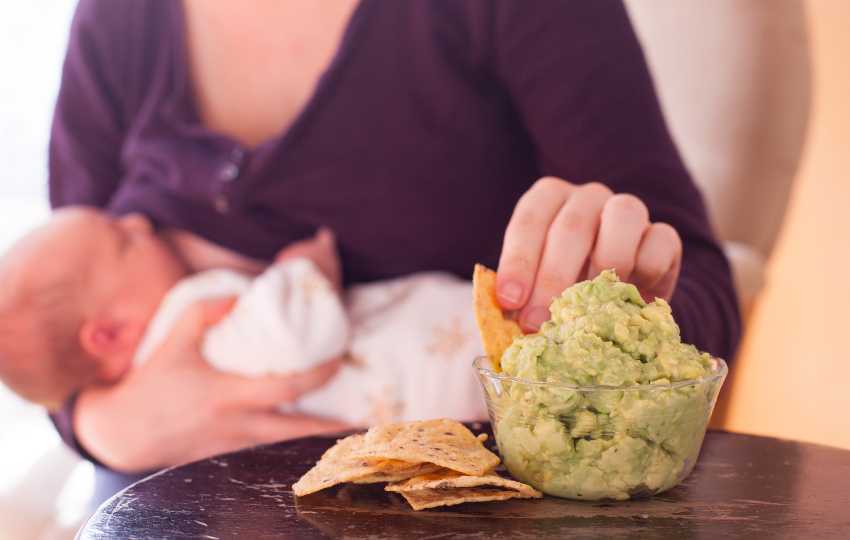 This is why breastfeeding is so important from the moment the baby is born. Mother's milk contains all the useful substances, vitamins and trace elements necessary for a newborn. During breastfeeding, it is very important that the mother's diet is rational, varied and balanced.
This is why breastfeeding is so important from the moment the baby is born. Mother's milk contains all the useful substances, vitamins and trace elements necessary for a newborn. During breastfeeding, it is very important that the mother's diet is rational, varied and balanced.
Why breastfeeding is good
To begin with, it is worth noting all the benefits that breastfeeding gives a newborn. The matter is in the composition and other features of mother's milk:
- It always has the right temperature.
- It contains all the necessary nutrients, vitamins and trace elements.
- It is able to adapt to the needs of the child, changing the composition and nutritional value over time, as E. Komarovsky writes about this in "The Beginning of Your Child's Life".
As a result, the child receives a product that is right for him. Of course, it is worth talking about safety only when the mother adheres to the appropriate diet.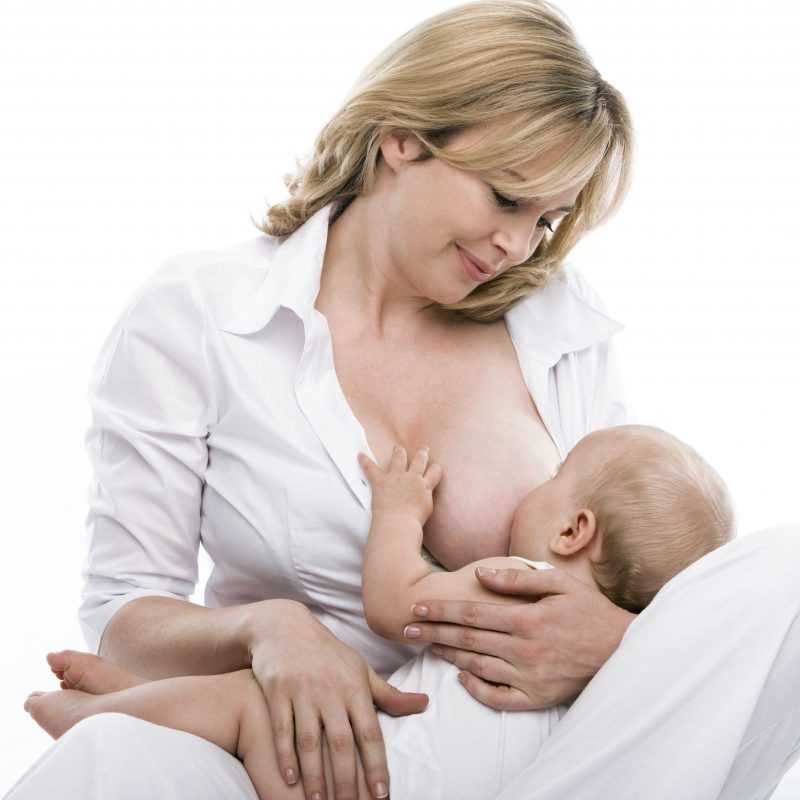 It should be remembered that food molecules eaten by a woman with breast milk enter the baby's body.
It should be remembered that food molecules eaten by a woman with breast milk enter the baby's body.
This is important!
If we talk about the benefits of breastfeeding for the woman herself, then it is worth referring to the study of the joint group study on hormonal factors in the development of breast cancer, conducted in 2002. It showed that breastfeeding reduces the risk of developing cancer of the reproductive system. So this is an excellent prevention of cancer, which can be triggered by hormonal surges in the body of a woman who has given birth.
Why good nutrition is important when breastfeeding
As mentioned above, everything that a mother eats enters the body of a child with breast milk. This brings great benefits for the health, full growth and development of the baby and the prevention of allergic diseases in the future. However, it can also harm him, cause digestive problems and an allergic reaction, because the gastrointestinal tract of the newborn is still being formed. Proper nutrition is a guarantee that the child will receive only useful things from the mother, which will help him fully grow and develop to the delight of his parents. Dr. Komarovsky recommends excluding from the mother's diet what was not in the diet of her great-grandmother.
Proper nutrition is a guarantee that the child will receive only useful things from the mother, which will help him fully grow and develop to the delight of his parents. Dr. Komarovsky recommends excluding from the mother's diet what was not in the diet of her great-grandmother.
What determines the quantity and quality of mother's milk
For obvious reasons, a young mother cannot help being nervous, but it is in her power to build her own daily routine. It is recommended to devote more time to rest: the more time a woman allows herself to sleep and refuse to perform heavy household chores, the better she feels. And her good health is the key to the health of the baby, who will receive all the necessary substances from the breast milk of a calm and well-rested mother. So, you can safely connect your husband to household duties (yes, he works, but motherhood is also hard work, which, by the way, is still not paid), relatives, friends or hired nannies and cleaners. A woman cannot feed properly if she does not have the opportunity to get enough sleep and do other things (we are not talking about cleaning and cooking, but about hobbies and cultural activities).
A woman cannot feed properly if she does not have the opportunity to get enough sleep and do other things (we are not talking about cleaning and cooking, but about hobbies and cultural activities).
What not to eat during lactation
Consider separately breastfeeding products that need to be limited or excluded. These include:- unheated products of animal origin - raw and undercooked meat (shish kebab, etc.), fish, sushi, unpasteurized milk, raw eggs
- any alcoholic beverages
- concentrated broths, preserves, pickles, marinades, sausages, hot spices and condiments
- strong tea and coffee (safe amount of caffeine up to 200 mg per day, a cup of coffee can contain 60-150 mg of caffeine, and tea - 30-60 mg)
Why are they dangerous? Everyone knows about the dangers of alcohol: it causes irreparable damage to health and destroys the organs of even an adult, and even more so a small child. Coffee and strong brewed tea contain caffeine, which, on the contrary, penetrates well into breast milk and has a stimulating effect on the nervous system of the baby.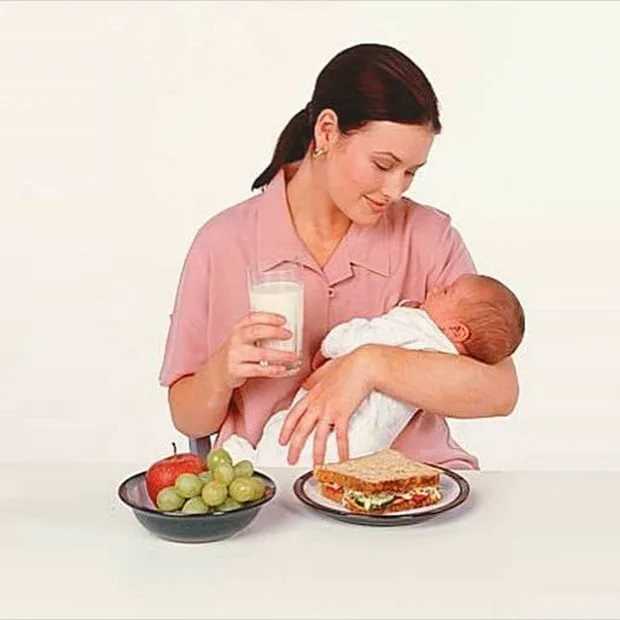
This is important!
Semi-finished products and carbonated drinks are harmful due to the high content of dyes, preservatives, salt and sugar. These foods can cause bloating and colic in the baby.
Products recommended for consumption
Allowed breastfeeding foods are vegetables, fruits (with caution tropical), cereals, lean meat, low-fat soups, cheese, boiled and baked fish. What is their use?
- Vegetables. In the first weeks it is recommended to eat raw vegetables with caution, it is better if they are boiled or stewed. Even heat-treated, they are a source of vitamins and have a beneficial effect on the intestines.
- Porridges are very satisfying and healthy, because a nursing mother needs a lot of energy! They contain slow carbohydrates, the necessary protein, vitamins and a whole range of minerals and trace elements.
- Lean meat is boiled or baked beef, veal, rabbit.
 Meat as a source of protein helps the body cope with stress, provides energy. A mother who is breastfeeding must definitely consume 100 g of meat per day.
Meat as a source of protein helps the body cope with stress, provides energy. A mother who is breastfeeding must definitely consume 100 g of meat per day. - Low-fat soups. In the first months of a baby's life, it is recommended to cook vegetable soups with beef or lean pork broth. They must be present in the diet of a nursing mother due to the presence of proteins, iron, amino acids and trace elements in them.
- Cheese. This product contains calcium, which is essential for both mother and growing baby.
- Boiled and baked fish. Its benefit is that it is rich in protein and omega-3, -6 polyunsaturated fatty acids. The fish also contains phosphorus and iodine, B vitamins, necessary for a nursing mother.
- Milk, dairy and sour milk products - a source of protein, calcium, pre- and probiotics.
Proper nutrition of a nursing mother is very important so that the baby receives as much of the necessary substances from mother's milk as possible.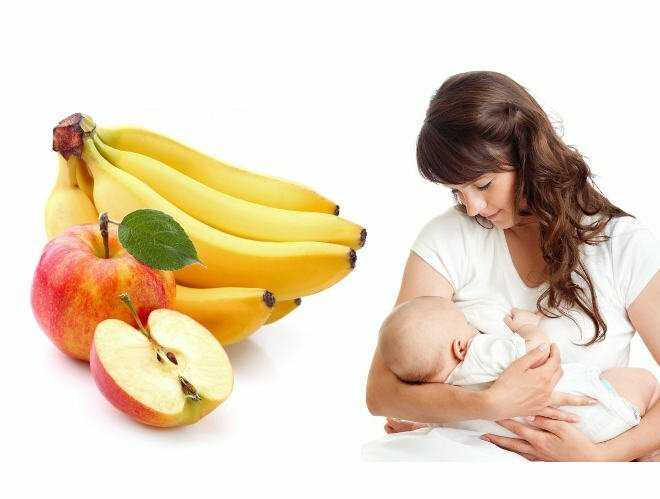 And then breastfeeding will be beneficial for the baby, and the nursing mother will help to enjoy her new role and realize the happiness of motherhood.
And then breastfeeding will be beneficial for the baby, and the nursing mother will help to enjoy her new role and realize the happiness of motherhood.
Video "Breastfeeding Rules Webinar with Breastfeeding Specialist"
Kushalieva Ksenia, pediatrician, breastfeeding specialist
(161 ratings; article rating 4.6)
Smoking while breastfeeding
Smoking while breastfeeding is harmful and dangerous, and nature does not give any concessions. Dear women, if you console yourself with the fact that your girlfriend or sister of an acquaintance smokes, breastfeeds and at the same time raises a healthy child, then you can only sympathize. I don't want to seem too rude, but smoking while breastfeeding is a manifestation of mother's selfishness and weakness.
Our advice in this situation can be only one: honestly answer yourself what is more expensive for you - dubious physical pleasure or the health of the baby, the foundations of which you laid while carrying him, but now you have a chance to either improve everything or completely ruin it. Based on scientific facts and practical experience, doctors take a categorical position on this issue: smoking while breastfeeding negatively affects both the child and the mother.
Problems with breastfeeding.
As you know, nicotine and other toxic substances that enter the body with tobacco smoke cause spasm of all blood vessels. Many problems develop from this, but the milk ducts also narrow. At the same time, the production of the hormone prolactin, which is responsible for the production of breast milk, is suppressed. As a result, the mother's milk becomes less and less, and it becomes more and more difficult for the baby to get it: the supply of milk from the glands to the nipple is deteriorating.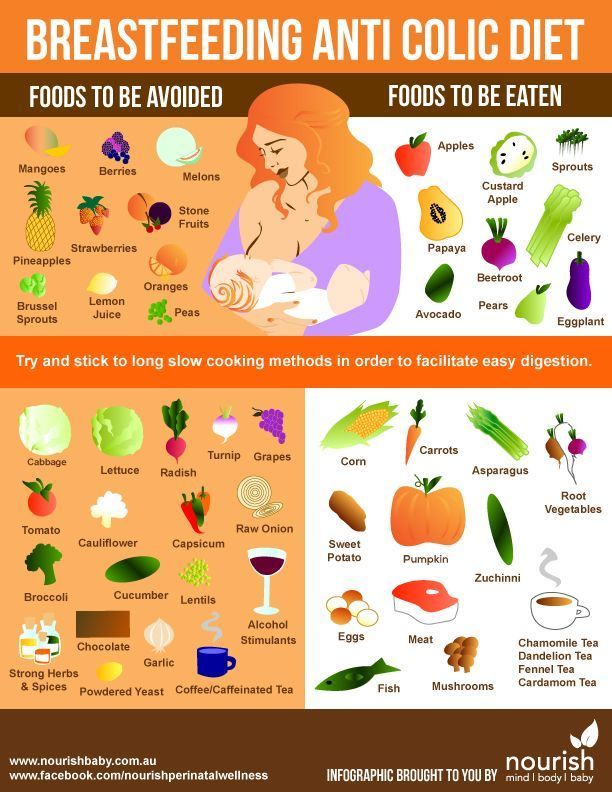 The composition of the baby's first food is also changing: the nutritional value and healing properties of the milk of a smoking mother are reduced, instead its "aggressiveness" increases, so to speak. Such milk causes a lot of discomfort and pain in the baby. If we also take into account that any product eaten by a mother affects the taste of breast milk, then one can only sympathize with a baby fed by a smoking mother.
The composition of the baby's first food is also changing: the nutritional value and healing properties of the milk of a smoking mother are reduced, instead its "aggressiveness" increases, so to speak. Such milk causes a lot of discomfort and pain in the baby. If we also take into account that any product eaten by a mother affects the taste of breast milk, then one can only sympathize with a baby fed by a smoking mother.
Together, these factors are the reason for weaning a newborn from the breast. Interestingly, early weaning of a child increases the likelihood that he will smoke at an older age. Scientists believe that in this way an adult is trying to compensate for the sucking reflex that was unsatisfied during infancy: as soon as we start to get nervous, it immediately makes itself felt - I want to smoke.
There is even a theory that from infancy a child develops an addiction to nicotine. And if this is true, then only you will be to blame.
Child's health problems.
Diarrhea, bloating and colic, nausea and even vomiting in a newborn are common symptoms of breastfeeding from a smoking mother. And unlike other cases, they appear more often and more pronounced. Due to the low vitamin and mineral composition of breast milk, the child does not gain weight, often gets sick and lags behind his peers in development. In addition, milk with nicotine causes irritability and anxiety in a small suckling. It has been observed that newborn babies of smoking mothers are twice as likely to go into continuous "unreasonable" crying.
Children of smoking mothers are much more likely to suffer from a runny nose and cough, and also experience breathing difficulties: they suffer from shortness of breath, diseases of the lungs and bronchi. Examination reveals chronic oxygen starvation of tissues, which inhibits all development processes.
Mother's health problems.
A nursing mother should not only be healthy, which is a priori impossible with nicotine addiction: you will find a lot of information on the fact that tobacco smoke affects all human organs and systems. However, the main thing is that the mother's body must constantly replenish the resources necessary for the child, which the little one receives with mother's milk. The smoking organism wears out many times faster, therefore, even with a full-fledged balanced diet, its needs cannot be fully satisfied.
To feed or not to feed?
The best thing you can do for your baby in this situation is to stop smoking completely. If smoking is more important to you, then at least reduce the number of cigarettes you smoke to a minimum. In this case, it will not be possible to completely eliminate the harm, but at least you will reduce it.
Do not give up breastfeeding because of smoking: this will not help much, because passive smoking also does a lot of harm to the newborn. In addition, pediatricians claim that if the recommendations described below are followed, while smoking, children still get sick less often than with artificial feeding.
In addition, pediatricians claim that if the recommendations described below are followed, while smoking, children still get sick less often than with artificial feeding.
Remember that parental smoking has a negative impact on the health of the child, even with artificial feeding, and the more often mom and dad smoke. In particular, the respiratory, vegetative-vascular and nervous systems of the crumbs suffer: respiratory and allergic diseases among this group of children are a very common occurrence. The percentage of SIDS (sudden infant mortality syndrome) is also significantly increased: the tragedy happens 7 times more often in families where both parents smoke.
Even if you continue to smoke and breastfeed, you can do something for your baby:
- Completely give up nighttime smoking - this is the time when milk is most active.
- Try not to exceed the daily limit of 4-5 cigarettes.
- Smoke immediately after feeding, leaving at least 2 hours before the next application.


